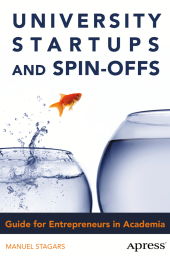 Neuerscheinungen 2014Stand: 2020-02-01 |
Schnellsuche
ISBN/Stichwort/Autor
|
Herderstraße 10
10625 Berlin
Tel.: 030 315 714 16
Fax 030 315 714 14
info@buchspektrum.de |

Manuel Stagars
University Startups and Spin-Offs
Guide for Entrepreneurs in Academia
1st ed. 2014. xiv, 248 S. 37 SW-Abb. 254 mm
Verlag/Jahr: SPRINGER, BERLIN; APRESS 2014
ISBN: 1-484-20624-X (148420624X)
Neue ISBN: 978-1-484-20624-9 (9781484206249)
Preis und Lieferzeit: Bitte klicken
University Startups and Spin-Offs teaches university students, researchers, and educators the most effective strategies and tactics for launching their own startups from academic platforms with the backing of school programs, public grants, incubators, seed accelerators, and private partnerships in all parts of the world.
Serial entrepreneur Manuel Stagars advises students, faculty, and researchers how to test their ideas for marketability, how to develop commercial products out of research projects, and how to engage companies and investors with attractive value propositions. The author has seventeen years of experience as startup entrepreneur, founder of seven companies in the United States, Europe, and Japan, consultant to universities on commercializing their research programs, angel investor, and startup mentor. Stagars´ advice is field-tested, battle-hardened, and supported with a wealth of instructive first-hand examples from his international experience.
The author advises academic entrepreneurs to take matters into their own hands instead of relying on the initiative and support of universities and governments. He shows students and researchers how to fit lean startup methods to their existing university ecosystems, leveraging their strengths without getting bogged down in bureaucratic morass. Avoiding theory and jargon, the book focuses on real-world situations, practical steps, checklists, and case studies. University students and researchers will learn the skills they need to become startup entrepreneurs on an academic platform.
The final part of University Startups and Spin-Offs addresses university administrators, educators, technology licensing officers, incubator managers, and government grant officers. It shows them with practical examples from the private and academic sectors how to integrate startups into the fabric of the university, develop a thriving entrepreneurial ecosystem for students and researchers, leverage latent network effects, build bridges between scientific research and industries seeking innovative solutions, enhance the public image of the university, and motivate the university´s best and brightest to engage in startup enterprises that will deliver benefits to the university and the public as well as to themselves.
The Status Quo: How Do Startups Fit Into Universities?
The Lean Startup Changed Everything
What Does It Mean to Be a Startup Entrepreneur?
Engaging Others with Actionable Next Steps
Benefits vs. Features
Simple Strategies to Get Unstuck
Troubleshooting
The Financial Model
The Legal Setup of Your Startup
Meetings and Communication Skills
Startup Grants: Can Government Programs Stimulate Entrepreneurship?
Venture Capital and Angel Investors
Incubators and Accelerators
Moving Past the Startup Stage
How Do Universities Measure the Impact of Their Research?
Why Do Many University Startups Not Take Off?
How Universities Can Support Their Startups Today
Building a Bridge to the Market
Platform Thinking for Startup Success
More Platform Objects
Manuel Stagars is a serial entrepreneur, business consultant, and founder of seven companies. A graduate with honors from London School of Economics (LSE), he holds certifications as a Chartered Financial Analyst (CFA), Chartered Alternative Investment Analyst (CAIA), and Energy Risk Professional (ERP). This enables him to blend creative entrepreneurship with contemporary macroeconomics and the perspective of an investor and venture capitalist. Mr. Stagars´ companies have worked on over two hundred client projects in the United States, Switzerland, and Japan. He is supporting startups as an angel investor and consults for them on business development, strategy, and platform thinking, and he is advising universities on their startups and spin-offs.


